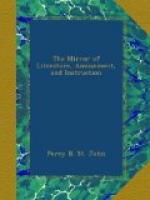* * * * *
RETROSPECTIVE GLEANINGS.
* * * * *
ENGLISH ROADS.
The roads of England are the marvel of the world. The improvements which have been effected during a century would be almost miraculous, did we not consider that they had been produced by the spirit and intelligence of the people, and were in no degree dependant upon the apathy or caprice of the ruling power. The first turnpike-road was established by an act of the 3rd Charles II. The mob pulled down the gates; and the new principle was supported at the point of the bayonet. But long after that period travelling was difficult and dangerous. In December, 1703, Charles III. king of Spain, slept at Petworth on his way from Portsmouth to Windsor, and Prince George of Denmark went to meet him there by desire of the queen. In the relation of the journey given by one of the prince’s attendants, he states, “We set out at six in the morning, by torchlight, to go to Petworth, and did not get out of the coaches (save only when we were overturned or stuck fast in the mire) till we arrived at our journey’s end. ’Twas a hard service for the prince to sit fourteen hours in the coach that day without eating any thing, and passing through the worst ways I ever saw in my life. We were thrown but once indeed in going, but our coach, which was the leading one, and his highnesses body coach, would have suffered very much, if the nimble boors of Sussex had not frequently poised it, or it with their shoulders, from Godalming almost to Petworth; and the nearer we approached the duke’s house, the more inaccessible it seemed to be. The last nine miles of the way cost us six hours’ time to conquer them; and, indeed, we had never done it, if our good master had not several times lent us a pair of horses out of his own coach, whereby we were enabled to trace out the way for him.” Afterwards, writing of his departure on the following day from Petworth to Guildford, and thence to Windsor, he says, “I saw him (the prince) no more, till I found him at supper at Windsor; for there we were overturned, (as we had been once before the same morning,) and broke our coach; my Lord Delaware had the same fate, and so had several others.”—Vide Annals of Queen Anne, vol. ii. Appendix, No. 3.
In the time of Charles, (surnamed the Proud,) Duke of Somerset, who died in 1748, the roads in Sussex were in so bad a state, that, in order to arrive at Guildford from Petworth, travellers were obliged to make from the nearest point of the great road leading from Portsmouth to London. This was a work of so much difficulty, as to occupy the whole day; and the duke had a house at Guildford which was regularly used as a resting-place for the night by any of his family travelling to London. A manuscript letter from a servant of the duke, dated from London, and addressed to another at Petworth, acquaints the latter that his grace intended to go from London thither on a certain day, and directs that “the keepers and persons who knew the holes and the sloughs must come to meet his grace with lanterns and long poles to help him on his way.”




